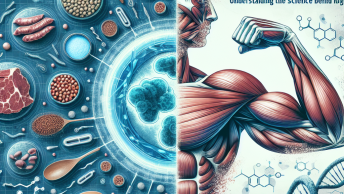When it comes to fitness and health, the terms “fat loss” and “weight loss” are often used interchangeably, but they actually refer to different processes and outcomes. If you’re on a journey to improve your body composition or overall health, understanding the distinction can be crucial. Here are 10 key differences that will help clarify why focusing on fat loss might be your best strategy.
1. Definitions Matter
- Weight Loss: This simply refers to a decrease in total body weight. This can include loss of water, muscle, and fat.
- Fat Loss: This specifically targets the reduction of fat mass in the body, which is a healthier and more sustainable goal.
2. The Scale Can Be Misleading
One of the biggest pitfalls people encounter is relying solely on the scale. Losing weight might look good on paper, but if that weight comes from muscle and water rather than fat, it could be detrimental to your health. Focusing on fat loss allows for a more holistic approach to body composition and health.
3. Different Approaches to Diet
-
For Weight Loss: Many quick-fix diets focus on calorie deficits, which can lead to significant muscle loss if not properly managed. These diets often cut down on essential nutrients, leaving individuals feeling deprived.
- For Fat Loss: A well-rounded diet that emphasizes macronutrients—proteins, fats, and carbs—encourages sustainable fat loss. It includes lean proteins, healthy fats, and complex carbohydrates that help maintain muscle while chipping away at fat stores.
4. Muscle vs. Fat Density
Muscle is denser than fat, meaning that a pound of muscle takes up less space than a pound of fat. This is why someone can look leaner and fitter while weighing the same or even slightly more. Focusing on fat loss encourages muscle retention, which contributes to a toned appearance.
5. Long-Term Solutions vs. Quick Fixes
Weight loss is often associated with fast results and trendy diets, which can be hard to maintain over the long haul. Fat loss, on the other hand, promotes gradual and sustainable changes in lifestyle, helping you maintain a healthy body composition in the long run.
6. Emotional and Mental Health Benefits
Focusing on weight loss can lead to an unhealthy obsession with the scale. Many people may feel discouraged if they don’t see numbers dropping quickly. However, shifting your focus to fat loss can empower you to celebrate non-scale victories, such as increased energy levels, improved physical performance, and better fitting clothes.
7. Role of Exercise
-
For Weight Loss: Many individuals resort to excessive cardio with the belief that burning calories will lead to weight loss. While effective in the short term, this approach can often lead to muscle loss and hinder metabolism.
- For Fat Loss: Incorporating strength training into your fitness routine is key. Lifting weights not only preserves muscle but also boosts metabolic rates even at rest, promoting fat loss over time.
8. The Importance of Maintenance
Once you lose weight—and especially if you lose it quickly—you still need to focus on maintenance to avoid regaining those pounds. Fat loss emphasizes adopting realistic lifestyle changes that you can stick with for a lifetime, rather than going back to old habits that led to weight gain.
9. Metabolism Changes
Rapid weight loss often results in a slowed metabolic rate, making it easier to gain weight back once the diet ends. Focusing on fat loss helps maintain or even improve metabolic function through muscle retention and overall health.
10. Expert Guidance is Key
Whether you’re focusing on weight loss or fat loss, having the right guidance can make all the difference. A program that emphasizes fat loss might be more effective for most individuals compared to a standard weight loss plan. Click Here to learn more about a program that focuses on fat loss techniques that could change your journey.
Conclusion
Understanding the differences between fat loss and weight loss is essential for anyone looking to improve their health and body composition sustainably. By shifting focus from mere numbers on a scale to the more meaningful goal of fat loss, you can achieve a healthier body, higher energy levels, and a better relationship with food and exercise. It’s not just about losing weight; it’s about transforming your body and lifestyle for the better.
So, remember, don’t get caught up in the scale—focus on fat loss for a stronger, healthier you!






